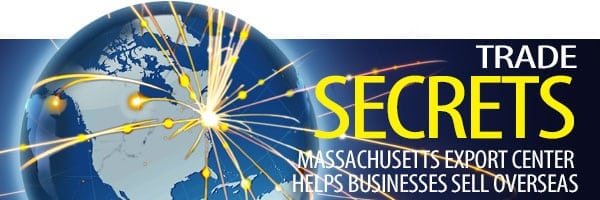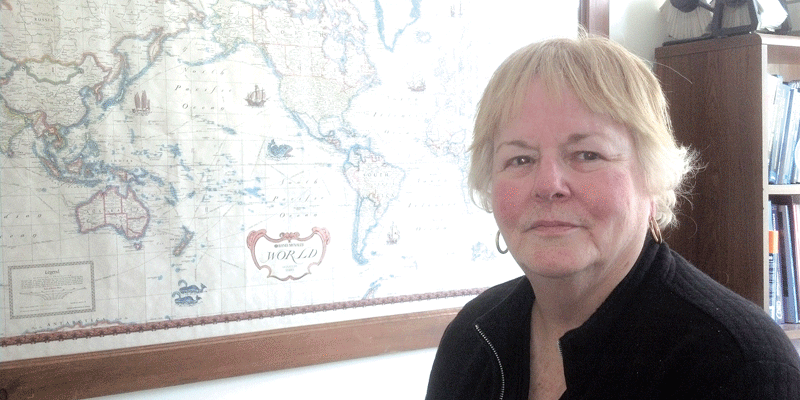
Trade Secrets
Massachusetts Export Center Helps Firms Do Business Overseas
 To Ann Pieroway, the statistics speak volumes.
To Ann Pieroway, the statistics speak volumes.
Take, for example, the fact that Massachusetts companies exported more than $26.8 billion in goods last year — a 4.63% increase over 2012 — and ranks as the 17th-highest exporting state in the U.S.
Or that the Bay State ranks second nationally in seafood exports, third in medical-device exports, and fourth in the U.S. in high-tech exports. Or that 28% of the state’s manufacturing workers depend on international exports for their jobs, which ranks fourth nationally.
Those achievements don’t happen in a vacuum, said Pieroway, regional director of the Western Mass. office of the Mass. Export Center (MEC).
“We have a very simple mission: to help companies throughout the Commonwealth achieve success in global markets and contribute to economic growth in our state,” she said. “The goal is to maintain jobs or grow jobs.”
It does so by providing a range of resources to client companies, from counseling and technical assistance to market research and assessment, to a wide range of training programs to help businesses navigate the tricky, hyper-regulated world of exports. As for the center’s effectiveness, Pieroway said, the numbers speak loudly there, too.
“For our latest impact study, we sent out a questionnaire to our clients — significant clients, not just somebody we’ve answered questions for,” she explained. Almost 70% responded, and reported $240 million in financial return from their dealings with the MEC in 2011. “That’s not total exports; that $240 million for 2011 is their increase in export sales due to the help they’ve received from the Massachusetts Export Center.”
With a background in offshore manufacturing, Pieroway has been involved in the export arena since 1983, when she was appointed to the governor’s International Trade Council.
“Back then, there were 27 different groups that had their fingers in international trade, but no one primary group,” she said, explaining the germination of the MEC. Paula Murphy, who still serves as statewide director, got the program running 20 years ago, and Pieroway came on board soon after. “We’re a specialty center of the Mass. Small Business Development Center Network, which put the funding in.”

Ann Pieroway says the success of the Massachusetts Export Center can be measured in the additional dollars exporters bring into the Bay State.
The state contributes as well, Pieroway said, and studies show that, for every tax dollar it kicks in, $4 is pumped back into the state economy. “So we don’t get cut; we’ve always been level-funded. We put out an impact study that goes to all legislators, and everyone can see what we do — $240 million is a lot of money.”
She also noted that the $2.2 trillion in overall U.S. exports accounts for 9.8 million jobs. “Supposedly, every time you get a $125,000 increase in export sales, a job is created somewhere in the network. That’s very important to us here in the Valley.”
Helping Hands
While Pieroway wasn’t at liberty to name specific clients, she did cite a broad range of services the agency provides, including:
Export counseling and technical assistance. These services are customized to each client’s needs, and might include:
• Export planning and preparation;
• Assessment of export readiness;
• Export strategy and international business-plan development;
• Assessment and selection of target export markets;
• International sales and marketing;
• Identification and qualification of overseas customers and partners;
• International payment and financing;
• Export logistics, including shipping, documentation, terms, and controls;
• North American Free Trade Agreement compliance and eligibility; and
• Working with export service providers, such as international banks, law firms, and freight forwarders.
International market research and assessment. The center has access to a wealth of information on export markets. Examples of research provided to clients include:
• General information on doing business in different countries;
• Demographic, economic, political, and cultural information on different countries;
• Market size, characteristics, and trends;
• Trade barriers and regulatory issues;
• Detailed statistical information on U.S. exports by state, product, and country.
International business-development assistance. Through the center’s partnership with other state and federal government agencies, companies can take advantage of specific programs to market their products and services internationally. These services include:
• International business-plan development;
• Assessment and selection of target export markets;
• Guidance on international sales, marketing, and distribution-channel development and management;
• Identification and qualification of overseas customers and partners;
• Participation in overseas trade shows and missions; and
• Connections with state and federal overseas offices for in-country support.
Export training programs. Partners for Trade, the state’s official export training initiative, is a regional collaborative between the Massachusetts Export Center, chambers of commerce, trade associations, economic-development agencies, and the private sector, working together to present frequent seminars on international trade.
Partners for Trade programs offer Massachusetts companies an overview of topics like international marketing, legal issues, export logistics, international distribution, and others, including country-specific and industry-specific export issues. Much of the training is provided by international trade experts from the private sector, including international business lawyers, export consultants, freight forwarders, international bankers, and international business executives from area companies. On average, more than 1,000 companies participate in the Partners for Trade program each year.
The Massachusetts Export Resource Center. Launched in 2012, the MERC offers a wide range of instructional and practical information on exporting, including training modules, video guides, workbooks, and templates.
The bottom line, Pieroway said, is that the MEC deals in information — lots of it.
“When I first started this job 19 years ago, we used to get reports from the Department of Commerce monthly, and we would send requests to Amherst; our research people would send us a stack of paper like this to take to our clients,” she said, spreading her hands a foot apart. “We no longer have a research department; we do all our own research, or have our interns do research. The things available today were nowhere near available 20 years ago; it’s all Internet research now.”
That information is invaluable to companies navigating the often-thorny, heavily regulated world of international business. Pieroway told of a seven-month-long effort to help a client send a product to China. “Anything going to China gets extra scrutiny. They finally allowed it, with all kinds of conditions. I just pray this company adheres to those conditions.
“We’ve helped companies in every industry there is,” she added, “from agriculture to guns to butternut squash to cosmetics to precision machining — you name it,” she said. And whether a client needs a license or legal assistance or any of a host of other requests, “I connect them with somebody who can help them. We have a wonderful network of support across the Commonwealth.”
Ship Shape
The day she spoke with BusinessWest, Pieroway was preparing for a Partners for Trade seminar in Holyoke called “Fundamentals of Exporting.”
“We want people to have a basic understanding of the process. For some people it’s daunting — there’s a little more paperwork going international — but we achieve results the same way you would domestically: research your client and find out who they are.”
The MEC recently launched another program, called Compliance Alliance, a forum for exporting firms that offers:
• Periodic briefings that address a variety of regulatory compliance issues and provide an opportunity for exporters to network and share best practices with one another;
• Conferences and seminars that provide in-depth training across a broad range of compliance and operational issues. Speakers include exporters, law firms, consulting firms and representatives from government export regulatory authorities;
• An e-newsletter containing updates about current compliance issues and events; and
• Online resources, such as a member directory, a compliance resource library, and a job board.
That word ‘compliance’ comes up often for a reason, Pieroway said, adding that the federal government has tried to simplify international trade, but those efforts have often just made it more difficult.
“We’re doing a lot more webinars, so a lot more people can participate, from all across the country,” she said. “We’re known for our compliance training. We know what companies are going through, and we do a lot of hand holding here.”
That hand-holding has led to national recognition, especially in 2008, when the agency won both the Presidential E Award for excellence in exporting — the highest honor the federal government issues in the exporting arena — and the SBA’s Service Excellence and Innovation Award.
“This year, we won the SBA award for the state and for the region,” Pieroway said. “We feel we should have won the national award, too. I think they thought we’d won too much.”
A 2010 survey found that more than 11,000 Masschusetts companies were exporting goods — about 90% of them small and medium-sized businesses. Along with all the other resources the MEC provides, Pieroway boils a company’s international-trade success down to a strong commitment — of people and resources — by top management.
“You’ve got to have someone in charge of this,” she said, reflecting back to when a company’s compliance ‘expert’ was often a secretary tasked with figuring out how to move product out of the country. “So they became the experts. Now there’s more emphasis on training.”
Pieroway conceded that most companies still get involved in exporting by being reactive, not proactive — for example, when foreign buyers take an interest in a product at a trade show. But the world has been shrinking, so to speak, for a long time, and opportunities abound in other countries for businesses willing to seek it out and learn the ins and outs of exporting. And that takes work.
“You cannot do international business sitting in your chair in your office; you have to leave the country to be really successful,” she said. “It depends on your commitment — of time, personnel, and money.”
Joseph Bednar can be reached at [email protected]





